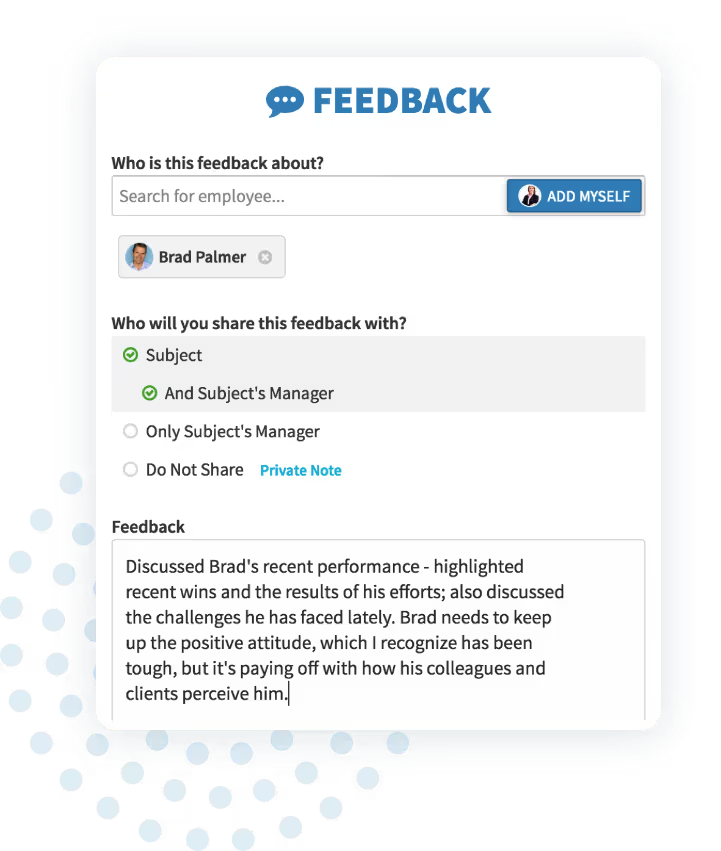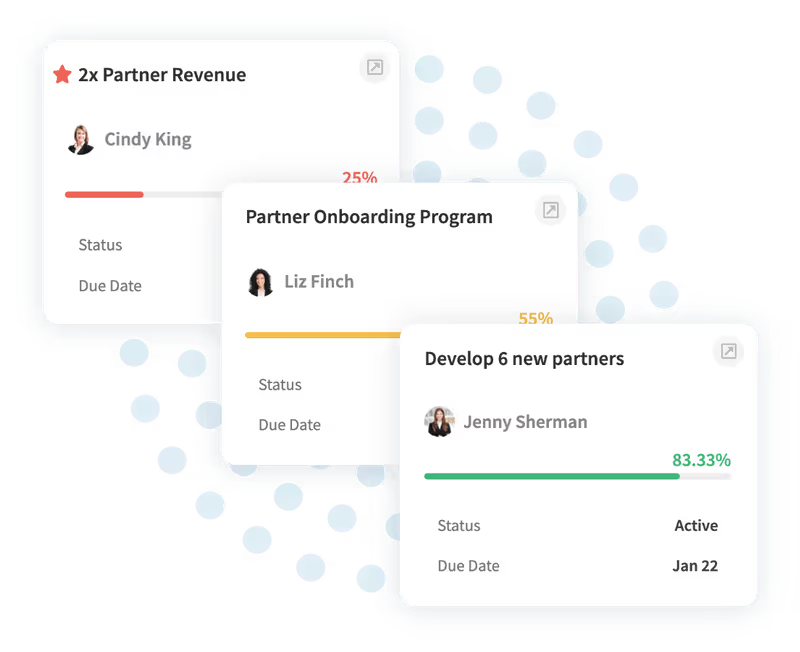10 Workplace Coaching Examples for Employee Development
Employee coaching can be a powerful tool to foster growth, enhance performance, and unlock organizational potential.
Moreover, it drives individual success, strengthens teams, and cultivates a culture of continuous improvement.
While developing a coaching strategy is important, it’s also helpful to see real examples, to assist with delivery.
We picked out 10 workplace coaching examples to help demonstrate what good coaching looks like. First, a little background for reference…
What is Workplace Coaching?
Workplace coaching is a developmental process where a manager or leader works one-on-one with an employee. These meetings can enhance skills, performance, and professional growth.
Unlike traditional training, coaching is more personalized. It focuses on the individual’s strengths and areas for improvement through regular feedback, goal setting, and support. The aim is to empower employees to reach their full potential while aligning their development with the organization's broader objectives.
Coaching is so important because of the familiarity it provides. Working with a close mentor who knows you so closely is beneficial. A more familiar face allows for friendlier yet more constructive and personalized feedback. These aspects make coaching so valuable for employees and your company.
Who Makes a Good Coach?
An effective workplace coach possesses several key qualities that enable them to support and guide their team members toward growth and success. Here are five important aspects that make someone an effective employee coach:
- Active Listening: A good coach listens carefully to understand employees' thoughts, goals, and challenges. This allows them to offer relevant guidance and build a supportive environment.
- Empathy: Demonstrating understanding and care for the employee’s perspective fosters trust. Additionally, it can strengthen the coaching relationship. Empathy makes employees feel valued and comfortable.
- Clear Communication: Effective coaches provide constructive, clear feedback. This ensures that expectations and action steps are easy to understand and implement.
- Goal-Oriented Approach: A strong coach helps employees set specific, measurable goals. Support and guidance for these goals also help employees stay on task and driven toward their future.
- Adaptability: Each employee is unique. A good coach should tailor their instruction to meet the individual’s needs, learning style, and career aspirations.
By mastering these qualities, a coach can foster a positive, growth-oriented environment where employees are empowered to reach their full potential.
10 Workplace Coaching Examples
Workplace coaching can take many forms. It often uses real-life scenarios to help employees develop specific skills. Here are several examples of workplace coaching, along with scenarios where these skills might be enhanced:
1. Developing Leadership Skills
Coaches help employees improve their leadership skills. They guide them in managing teams, delegating tasks, and leading meetings. This coaching is beneficial as it prepares employees for managerial roles, improving the company's leadership pipeline.
Another scenario requiring coaching is when an employee is promoted to a leadership position. Coaches can help with the transition. They should teach the new leader to motivate and manage their team.
2. Improving Communication
Coaches assist employees in developing clear and effective communication, both in verbal and written forms, such as delivering presentations or sending professional emails. This improves collaboration and reduces misunderstandings.
Another scenario where coaching is helpful is when an employee needs to communicate with clients or customers. A coach can teach them to convey the company's message and engage clients professionally.

3. Enhancing Time Management
Coaches help employees improve their time management skills. They do this by helping them prioritize tasks, set deadlines, and break projects into smaller steps. This leads to better productivity and less stress.
A scenario requiring coaching could be when an employee is struggling to meet deadlines consistently. A coach can guide them in organizing their workload more effectively.
4. Building Emotional Intelligence
Coaches help employees develop emotional intelligence, which involves understanding and managing their emotions and empathizing with others. This fosters a more positive and collaborative work environment.
A situation where coaching may be necessary is when an employee is experiencing conflict with colleagues. A coach can guide them in managing emotions and improving workplace relationships.
5. Strengthening Problem-Solving
Coaches help employees with complex challenges. They encourage them to analyze problems, explore solutions, and make informed decisions. This enhances their ability to solve problems independently.
Another scenario where coaching is useful is when an employee encounters frequent decision-making challenges. A coach can teach them methods to evaluate options and choose the best course of action.
6. Boosting Team Collaboration
Coaches support employees in improving their collaboration skills by teaching them how to communicate effectively within a team, resolve conflicts, and contribute to group projects. This leads to stronger teamwork and higher productivity.
A scenario where coaching is beneficial is when a team is struggling with poor coordination. A coach can teach team members how to collaborate more efficiently and achieve shared goals.

7. Mastering Conflict Resolution
Coaches help employees develop conflict resolution skills by teaching them how to address disagreements professionally, find common ground, and negotiate win-win solutions. This reduces tension in the workplace.
A scenario where coaching is needed could be when team members regularly experience disputes. Coaches can guide them on how to handle conflicts constructively.
8. Adapting to Change
Coaches assist employees in adjusting to changes in the workplace, such as new processes or technologies, by teaching them how to adapt with a positive mindset. This promotes flexibility and innovation.
A scenario where coaching is valuable is during a company-wide system upgrade. Coaches can help employees learn the new technology and smoothly transition into new workflows.
9. Enhancing Creativity and Innovation
Coaches foster creativity by encouraging employees to think outside the box, brainstorm, and take risks. This can lead to innovative solutions that benefit the company.
A scenario for coaching might be when a team is tasked with developing a new product or service. Coaches can teach creative thinking techniques that lead to breakthrough ideas.
10. Developing Sales Techniques
Coaches can help sales teams improve their skills. They can help focus on rapport, negotiation, and closing deals to contribute to sales performance.
A scenario requiring coaching is when a new salesperson joins the team. A coach can provide training on best practices and strategies to help them succeed in their role.
More Ways to Assist in Coaching
All of these scenarios commonly occur in the workplace. Having prepared coaches can help your team develop even faster and with fewer mistakes. However, tracking and measuring all of the aspects of coaching can be difficult. Because of this, performance management software can be a great help for employee coaching.
With PerformYard, coaches can set goals, track progress, and find areas to improve. This offers employees clear insights into their strengths and areas for growth.
The software’s ability to track performance data allows for more objective, data-driven feedback. This lets coaches give guidance that helps employees improve their skills and align with company goals.
Additionally, PerformYard fosters a culture of accountability by empowering employees to actively participate in their growth, tracking their progress over time.





